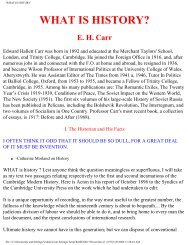The bronze age and the Celtic world - Universal History Library
The bronze age and the Celtic world - Universal History Library
The bronze age and the Celtic world - Universal History Library
Create successful ePaper yourself
Turn your PDF publications into a flip-book with our unique Google optimized e-Paper software.
FS AND Q'S 147<br />
of France <strong>and</strong> <strong>the</strong> British Isles. All <strong>the</strong>se seem to have come from <strong>the</strong> same <strong>Celtic</strong> cradle<br />
<strong>and</strong> to have been of <strong>the</strong> same racial t3^e or, to speak more accurately, types. Later still,<br />
we have seen that <strong>the</strong> Koban folk, who had learned <strong>the</strong> use of iron in <strong>the</strong> neighbourhood<br />
of <strong>the</strong> Caucasus, returned to <strong>the</strong> Danube valley, after which some of <strong>the</strong>m entered Greece<br />
as Dorians, while o<strong>the</strong>rs entered Italy with <strong>the</strong> Villa-nova culture <strong>and</strong> a third group<br />
pursued <strong>the</strong>ir predecessors over all parts of France except <strong>the</strong> Seine valley. It seems<br />
possible, if not probable, that <strong>the</strong>se two waves of invasions may have been those which<br />
brought Q <strong>and</strong> P speech respectively into <strong>the</strong>se different parts of Europe. If this equation<br />
be accepted, <strong>the</strong> main features of Sir John Rhys' hypo<strong>the</strong>sis have been proved. But<br />
it will not be wise to jump too hastily to a conclusion, for <strong>the</strong> fact that <strong>the</strong>re were two<br />
waves of invaders <strong>and</strong> two of Wiro dialects may be only a coincidence. We must<br />
attempt to apply a confirmatory test.<br />
In Greece we have seen that Casson has shown good cause why we should beheve<br />
that <strong>the</strong> advance of <strong>the</strong> men with <strong>the</strong> iron sword should be equated with <strong>the</strong> Dorian<br />
invasion. <strong>The</strong> Dorians spoke a P dialect <strong>and</strong> may well have been <strong>the</strong> first to introduce<br />
such a tongue into Greece. We have seen how Rhys' view that Q dialects survive<br />
in <strong>the</strong> writings of Herodotus <strong>and</strong> Hippocrates is open to question, but we have also noted<br />
that Wace had equally questioned <strong>the</strong> " Achaean " invasion proposed by Ridgeway. I<br />
have already put forward an amended scheme for <strong>the</strong> latter, <strong>and</strong> suggested <strong>the</strong> arrival<br />
of only a few Nordic adventurers. Had <strong>the</strong>se been Wiros of Q speech, <strong>the</strong>y could not,<br />
owing to <strong>the</strong> paucity of <strong>the</strong>ir numbers, have imposed <strong>the</strong>ir tongue upon <strong>the</strong>ir subjects.<br />
If, <strong>the</strong>refore, we accept <strong>the</strong> equation for Greek l<strong>and</strong>s, we need not expect to find<br />
evidence of <strong>the</strong> survival of Q speech in Greece in <strong>the</strong> fifth century.<br />
But I have suggested that <strong>the</strong>se " Achaean " adventurers were stragglers from<br />
<strong>the</strong> b<strong>and</strong> of Nordics who were responsible for <strong>the</strong> Phrygian invasion of Asia Minor. If<br />
<strong>the</strong> equation, which we are endeavouring to prove, were true, we should expect that<br />
<strong>the</strong> Phrygian langu<strong>age</strong> was of <strong>the</strong> Q form. Unfortunately we know httle of <strong>the</strong><br />
Phrygian tongue even in <strong>the</strong> palmy days of A<strong>the</strong>ns, still less of its form in <strong>the</strong> thirteenth<br />
century.<br />
All philologists are agreed that with <strong>the</strong> langu<strong>age</strong> of Thrace it formed <strong>the</strong><br />
Thraco-Phrygian group, from which, according to some philologists, modern Albanian<br />
is derived. Dacian is also beUeved to have belonged to <strong>the</strong> same group. Some years







